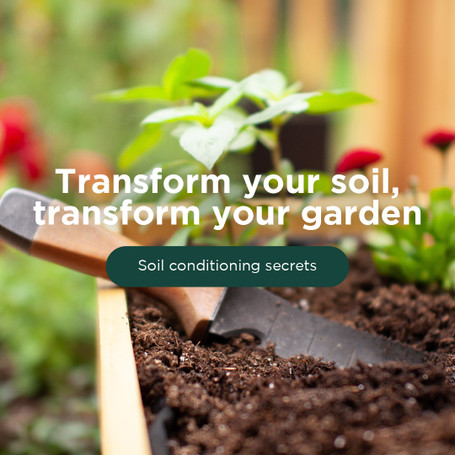Transform Your Soil, Transform Your Garden: Expert Tips for Soil Conditioning
Great gardens don’t begin with plants — they begin with soil. Whether you’re dreaming of vibrant flower beds, productive veggie patches, or lush green lawns, the secret to success lies below the surface. Soil conditioning is the foundation for healthy plant growth, improved water retention, and thriving microbial life. In this guide, we’ll explore expert-approved soil-conditioning secrets that will help you cultivate nutrient-rich, structurally sound soil — and a garden that flourishes.
What is Soil Conditioning?
Soil conditioning is the process of improving soil structure, fertility, and biological activity to create the best environment for your plants to thrive. Over time, garden soils can become compacted, depleted of nutrients, or imbalanced in pH. Conditioning reverses these issues by introducing organic matter, boosting microbial activity, and adjusting soil texture and chemistry.
Why Does Soil Conditioning Matter?
Healthy, well-conditioned soil is the key to:
- Better water retention and drainage
- Enhanced root development
- Greater nutrient availability
- Stronger, more resilient plants
- Increased crop yields
If your plants look stunted, yellowed, or wilted despite regular care, the issue may lie in the soil.
Step 1: Add Organic Matter
One of the easiest and most effective ways to improve your soil is by adding organic matter like compost, manure, or worm castings. These amendments enhance the soil’s structure, increase its ability to retain moisture, and feed beneficial microorganisms.
Product Spotlight: Worm Hit Pellets are an excellent choice for adding organic matter. These pellets are rich in nutrients and loaded with beneficial microbes, making them perfect for boosting soil fertility naturally.
Step 2: Mulch Like a Pro
Mulching helps regulate soil temperature, conserve moisture, and suppress weeds. A thick layer of organic mulch like straw, bark chips, or coconut coir can dramatically improve soil health.
Expert Tip: Coconut coir mulch is particularly effective at moisture retention and weed suppression while breaking down slowly to enrich the soil over time.
Product Suggestion: Weedgunnel Spunbonded – a high-quality, breathable fabric ideal for reducing weed growth and maintaining soil moisture in both garden beds and crop rows.
Step 3: Test and Adjust Soil pH
Not all soils are created equal. Some are too acidic, others too alkaline — and either condition can prevent your plants from absorbing nutrients effectively. Test your soil’s pH and adjust accordingly:
- Use garden lime to raise pH (make it more alkaline)
- Use sulfur to lower pH (make it more acidic)
Product Recommendation: Soil pH Test Kit helps monitor soil temperature and environmental conditions that affect pH and plant health.
Step 4: Improve Drainage
If your garden has heavy, clay-based soil, drainage can be a serious issue. Waterlogged roots lead to root rot and poor plant performance. Improve your soil’s drainage by mixing in:
- Coarse sand or grit
- Organic matter (compost, aged manure)
- Gypsum (to help break up clay)
Gypsum improves the soil’s physical structure without altering its pH — making it a go-to solution for clay-heavy gardens.
Step 5: Use Seaweed Fertilisers
Seaweed is one of nature’s best soil conditioners. Packed with micronutrients, hormones, and enzymes, seaweed-based fertilisers enhance root development, increase resistance to pests and disease, and stimulate microbial life in the soil.
Recommended Product: Seaweed Master is a top-performing natural conditioner ideal for boosting plant health, improving soil structure, and building resilience in tough conditions.
Step 6: Boost Water Retention in Dry Soils
Dry, sandy soils often struggle to hold onto water and nutrients. Improve their capacity by adding water-storing gels or crystals.
Try This: Growrite Water Crystals can absorb and release water hundreds of times their weight. These crystals help plants thrive between watering, reduce water usage, and improve transplant success.
Step 7: Try a Planting Gel for Root Zone Support
Transplant shock can slow growth or even kill young plants. A good planting gel delivers moisture and nutrients directly to the root zone during establishment.
Recommended Product: Earthcare Planting Gel combines water crystals with Seasol and essential nutrients to boost root development and plant resilience.
Bonus Tip: Label and Track Your Soil Trials
Keep a record of your soil improvement efforts with easy-to-use plant labels.
Garden Essential: B1 100mm Plant Labels are perfect for marking trial areas, plant varieties, or noting different soil amendments in specific zones of your garden.
Ready to Transform Your Garden?
Remember, great soil doesn’t happen overnight — but with consistent care and the right tools, you’ll see healthier, more vibrant plants season after season. By incorporating compost, balancing pH, improving drainage, and feeding the soil with organic conditioners, you’ll set the stage for a thriving garden.
? Explore more garden and soil conditioning solutions at The Garden Superstore and start building your healthiest soil yet.

